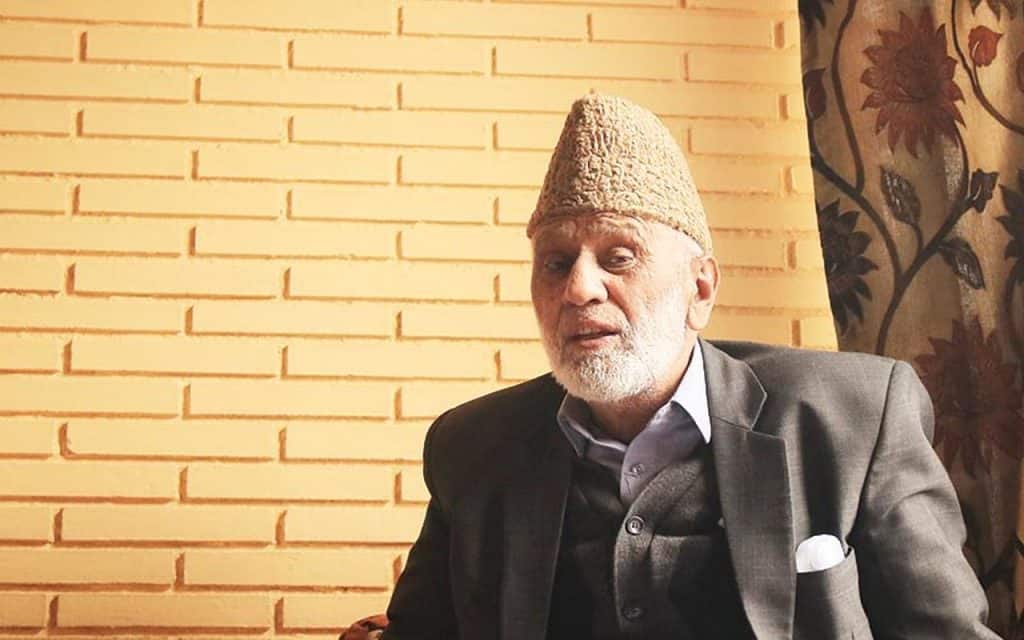Srinagar: The death of jailed senior separatist leader and Tehreek-e-Hurriyat (TeH) chairman Mohammad Ashraf Sehrai has raised serious questions regarding the plight faced by Kashmiri prisoners outside the valley with many calling his demise a custodial killing.
The 77-year-old politician passed away on Wednesday at Government Medical College in Jammu district of the Union Territory of Jammu and Kashmir after a brief illness.
The veteran leader was admitted in the hospital after he developed serious breathing issues inside Kot Bhalwal Jail in Jammu where he was imprisoned under Public Safety Act from last one year. “Sehrai has died this afternoon after a brief illness,” Anshul Garg, Deputy Commissioner of Jammu said.
His Rapid Action Test (RAT) had come negative but his RT-PCR for Covid-19, which was awaited at the time of his death, has now come positive, a local news gathering agency reported.
However, many in the Valley believe that Sehrai’s death was no less than a cold-blooded murder and they accuse the authorities of violating basic human rights by denying proper medical care to Kashmiri prisoners.
“It’s the murder of humanity. It’s the murder of Geneva rules how to hold political prisoners. It is a custodial killing. Shame on Indian democracy,” Saleem Wani, a resident of Srinagar said.
Many human rights activists in the past have claimed that many political leaders who are detained under the Public Safety Act (a preventive detention law that allows the authorities to jail any person for up to three months without a trial) need instant medical attention.
“It was only after the state found Ashraf Sehrai Sahab to be on the brink of death that he was hospitalized,” wrote Ahmad Bin Qasim on his Facebook timeline.
Qasim, the son of veteran incarcerated separatist couple, Asiya Andrabi and Qasim Faktoo, alleged that Sehrai was not feeling well from several months and was denied medical care in jail.
On many occasions families of the Kashmiri prisoners have raided the voice against the hardships faced by Kashmir’s political inmates. “This won’t be the last time we shall hear of the death of our prisoners in Indian custody. Some of our prisoners are in jails since the 90s. Most of them are 60+. Almost all of them are ailing. They are kept alive through painkiller injections. Until their body gives in. But their steadfastness does not,” Qasim said in another post.
Qasim in one of his previous posts had alleged that his mother’s backache has increased as the “jail authorities fine them rupees 500” if they sit on a chair.
Ahsan Untoo, a human rights defender who has spent several years in prison, told Siasat.com that he has witnessed casualties of three Kashmiris inside the prison as no one bothers about their declining health. “It simply is a case of discrimination for being a Kashmiri,” Untoo said, adding a non-Kashmiri criminal is being released on a parole to attend the marriage of his daughter while as political prisoners from Kashmir are being left on God’s mercy. “Custodians of prison are not acting like the guardians but murderers.”
Sharing a news article on Sehrai’s demise, Kashmiri anthropologist M Junaid said that there is no difference between killing and actively creating conditions of someone’s death.
“When a state can’t take care of its own people, how could it ever look after the health of political dissidents it has declared as enemies and imprisoned? There is no difference between killing and actively creating conditions of someone’s death,” he wrote on Twitter.
Meanwhile, People’s Conference president, Sajad Lone, also raised questions on the Hurriyat leader’s death and said that Sehrai was a political leader not a terrorist.
“And why did he have to die in incarceration and not at his home amongst his kin and loved ones. Have we become so weak that an old infirm dying person is a threat to the state. I am not being critical. But please introspect. Seharai Sahib was a political leader not a terrorist,” he wrote in a tweet.
Sehrai’s political journey
Mohammad Ashraf Sehrai was born in 1944 in Tekipora village of north Kashmir’s Kupwara district. He completed his primary education from Sogam Lolab High School in 1959 and later joined Aligarh Muslim University in Uttar Pradesh, where he earned his bachelor’s degree.
Sehrai was associated with Jamaat-e-Islami and acted as a secretary of another veteran separatist leader Syed Ali Shah Geelani when he was the Ameer-e-Zillah of north Kashmir’s Baramulla district. “Once Geelani shifted to Srinagar because of his political engagements Sehrai too shifted to Srinagar,” political analyst and former Dean of the School of Legal Studies at Central University of Kashmir, Dr Sheikh Showkat Hussain told Siasat.com.
Sehrai also contested election against Sheikh Mohammad Abdullah, the former Chief Minister of J&K and the founder of National Conference, from Central Kashmir’s Ganderbal district. “Soon after the election, Jamaat was banned because of an emergency in the whole of India and Sheikh Abdullah extended the ban in Jammu and Kashmir,” Hussain said, adding that many Jamaat workers including Sehrai were arrested.
“Sheikh Abdullah made it a point that Sehrai is logged in the same cell of Kot Bhalwal Jail where he himself was logged for many years,” he added.
Sehrai assisted Geelani throughout and also accompanied him in Hurriyat and remained with him up to the last breath.
Sehrai was nominated as the successor by Geelani after his health deteriorated and the decision was endorsed by the Hurriyat executive. “Sehrai sahib was more hardliner than Geelani with utmost conviction and devotion,” another political analyst told Siasat.com on the condition of anonymity. “He stood for Kashmir’s accession with Pakistan,” he said.

